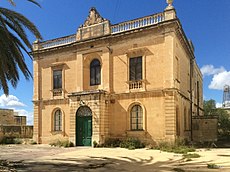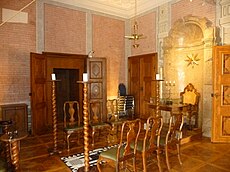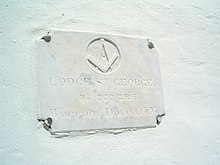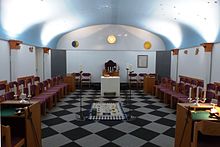Is A Madonuc Service A Private Servive

A Masonic club, often termed a individual lodge or elective guild, is the basic organisational unit of measurement of Freemasonry. It is likewise unremarkably used equally a term for a edifice in which such a unit meets. Every new lodge must be warranted or chartered by a Grand Lodge, but is subject to its direction only in enforcing the published constitution of the jurisdiction. By exception the three surviving lodges that formed the world's first known grand order in London (now merged into the United K Lodge of England) have the unique privilege to operate as fourth dimension immemorial, i.e., without such warrant; only i other society operates without a warrant – the Thou Stewards' Lodge in London, although it is not also entitled to the "time immemorial" championship.[note 1] A Freemason is generally entitled to visit any order in any jurisdiction (i.e., under whatsoever One thousand Lodge) in amity with his own. In some jurisdictions this privilege is restricted to Chief Masons (that is, Freemasons who have attained the Club's third caste). He is first ordinarily required to bank check, and certify, the regularity of the relationship of the Lodge – and be able to satisfy that Lodge of his regularity of membership. Freemasons gather together as a Society to piece of work the three bones Degrees of Entered Apprentice, Fellowcraft, and Main Stonemason.
Masonic premises [edit]



Technically, Freemasons run into as a order, not in a guild. In this context, the word "lodge" refers to a local affiliate of Freemasons, meeting equally a body. Nevertheless, the term is often misused to refer to the buildings or rooms that Masons run across in. Masonic premises are likewise sometimes referred to as temples ("of Philosophy and the Arts"). In many countries Masonic centre or Masonic hall has at present replaced these terms to avert arousing prejudice and suspicion. Several unlike lodges, or other Masonic organizations, oftentimes utilize the same premises at different times.
Types [edit]
Bluish social club due south, craft lodges or ancient craft lodges refer to the lodges that work the first three Masonic degrees, rather than the appendant Masonic orders such as York Rite and Scottish Rite. The term "craft society" is used in Great Uk. The blue lodge is said to refer to the traditional colour of regalia in lodges derived from English language or Irish Freemasonry. Although the term was originally frowned upon, it has gained widespread and mainstream usage in America in contempo times.[1]
Research lodges have the purpose of furthering Masonic scholarship. Quatuor Coronati Guild, in London, is an case of a research society; it has a strictly limited membership and receives visitors and papers from all over the world. Many jurisdictions take well-established inquiry lodges, which unremarkably meet less oftentimes than bluish lodges and do non confer degrees.
In Great Britain, a lodge of instruction may be associated with a Society, but is not constituted separately. The lodge of instruction provides the officers and those who wish to get officers an opportunity to rehearse ritual under the guidance of an experienced brother; in that location may besides be lectures effectually the ritual and the symbolism in the club within a Lodge of Pedagogy, in order to develop the knowledge and understanding of the membership.
In some jurisdictions in the United States, the lodge of instruction serves as a warranted lodge for candidate instruction in other aspects of Freemasonry likewise ritual rehearsal, as well equally hosting a speaker on topics both Masonic and non-Masonic.
In Slap-up Great britain, the term female parent order is used to place the particular Gild where the private was offset "fabricated a Mason" (i.e. received his Entered Amateur degree). 'Mother gild' may also refer to a club that sponsors the creation of a new lodge, the daughter guild, to be warranted under the jurisdiction of the same m guild; specific procedures pertaining to this vary throughout history and in different jurisdictions. Lodge Female parent Kilwinning No 0 in the Grand Lodge of Scotland is known as the Mother Lodge of Scotland, having been referred to in the Schaw Statutes of 1598 and 1599, and having itself warranted other lodges at a fourth dimension when it did not subscribe to a grand order.
The 21st century has seen the ascension of net virtual lodges that run into online rather than in person. Examples are the Net Society No. 9659, Lodge Republic of ireland, and Castle Island Virtual Lodge No. 190. The power to hold remote social club meetings allows those who are afar to continue to nourish, whether they are military servicemen serving overseas or they inhabit a sparsely populated region.
System [edit]

Plaque of Guild St. George, the 1797 Masonic Guild which has been housed in Bermuda'south former Country House since 1815
Lodges are governed past national, country or provincial government, unremarkably called Grand Lodges or Grand Orients, whose published constitutions define the structure of freemasonry nether their potency, and which engage G Officers from their senior masons. Provincial G Lodges (which in England mostly represent to celebrated counties) exercise an intermediate say-so, and too engage Provincial G Officers.
Different grand lodges and their regions bear witness subtleties of tradition and variation in the degrees and practice; for example under the Grand Lodge of Scotland, the Marker Degree (which is unrecognised by the United Grand Guild of England, only has a separate Mark Grand Lodge) is integrated into "The Arts and crafts" every bit a completion of the 2d degree. In whatsoever example, K Lodges have limited jurisdiction over their member Lodges, and where there is no prescribed ritual Lodges may thus take considerable freedom of do. Despite these minor differences, fraternal relations exist betwixt Lodges of corresponding degrees under different Grand Lodges.
Membership [edit]


Generally, to be accepted for initiation as a regular Freemason (in a guild following Anglo-American fashion), a candidate must:
- Be a homo
- Come of his ain free volition past his own initiative or past invitation in some jurisdictions.[2]
- Believe in some kind of Supreme Being.[ii]
- Be of good morals, reputation and financially supporting himself and family unit.[2]
- Be at least 21 years old (may be equally immature every bit eighteen or equally old as 25, depending on the jurisdiction).[2]
- Alive in the jurisdiction (under some Thou Lodges in the United States.)[3]
- Exist able to pass interviews and pass the Investigation Commission's inquiries nigh his past with people who accept known him, which tin take upwardly to ii years.[2]
- Exist of sound listen and body.[4] (this is non a universal requirement).[2]
- Be a "Gratuitous Man". This may accept arisen from the refusal of operative masons to pass their secrets to slaves, who could exist ordered to divulge them to others.[5] It may also take arisen from a requirement of early speculative lodges that a new Freemason should at to the lowest degree have a licence to trade and employ others, making him a Free Man of the city or borough of the lodge.[half-dozen]
- Pass the vote of the Lodge to allow his membership.[ii]
After a Lodge elects or approves a candidate in accordance with the requirements of its Grand Lodge, it will decide whether to give the candidate each degree in order. By and large speaking those who have but received the Entered Apprentice degree are considered Freemasons, merely hold limited privileges until they attain the Master Mason degree; under UGLE only a Chief Bricklayer volition receive a Grand Club document, which may be demanded by whatever other Lodge he wishes to visit.


A Main Mason is considered a full lifetime member of the Lodge where he received his degrees. He can demit (resign)[7] if he so desires but only if he is in good standing and his dues paid. A Mason might demit for personal reasons or to bring together another Gild in those jurisdictions where multiple membership is not permitted. Later on demitting, he continues to exist regarded as a Mason in absentia and may rejoin through a new application, simply he and his family have no rights, privileges or claims on Freemasonry.[8] Some sources (Mackey) claim that leaving the gild does non exempt him from his obligations nor the wholesome control of the Order over his moral conduct.[9] A Mason may be expelled from his Lodge and Freemasonry in full general if convicted of particularly serious violations of Civil or Masonic law. Expulsion from all of Freemasonry tin can only occur from a Grand Social club while lesser chapters tin can expel members from their specific lodges.[nine]
A Master Bricklayer "in expert standing" (i.east. whose ante are current and who is not subject area to Masonic investigation or subject area) may join another regular Lodge; he need non take his degrees again, only may be expected to serve the new Gild in office.
If a Master Mason is dropped from the rolls for non-payment of dues, under most circumstances he may be immediately reinstated in practiced continuing but by paying his electric current ante too equally any back dues owed, although in many jurisdictions there is a requirement to ballot for re-admission.
Many Grand Lodges allow Principal Masons to exist "plural affiliates," or members of more than than one Lodge simultaneously. In some jurisdictions plural affiliates are prohibited from serving equally an elected officer of more than one Lodge at any given time.
These rules are different for Freemasons of the Entered Apprentice and Fellowcraft Degrees. In some Thousand Lodges an Entered Amateur or Fellowcraft may not receive a demit, simply may bring together another Lodge with the intent of earning the Master Bricklayer Degree with the consent of his original Order.
Officers [edit]
The names, roles and numbers of Lodge officers vary widely from jurisdiction to jurisdiction. In most cases, there is an equivalent office in the Grand Lodge of the given jurisdiction, with the addition of the prefix 'Grand' to the title in question.
There are sure 'progressive' offices through which members move by a process of constructive promotion, only likewise other more permanent offices, commonly held by experienced members.
Come across also [edit]
- Grand Lodge
- Masonic music
- Masonic ritual and symbolism
- Research lodge
Notes [edit]
- ^
...the premier Thou Order was established on 24 June 1717, St John'southward Day, when a banquet was held at the Goose and Gridiron Ale House in St Paul's Churchyard. The four Lodges involved met at the Goose and Gridiron, the Crown Ale Firm in Parkers Lane (nearly the present building in Great Queen Street), The Apple Tree Tavern in Charles Street, Covent Garden and the Runner and Grapes Tavern in Channel Row, Westminster. Three nonetheless survive and are now known equally Lodge of Antiquity No two, Fortitude and Old Cumberland Lodge No 12 (originally No 3) and Regal Somerset House and Inverness Society No IV. These are known equally "time immemorial lodges" the but lodges within the English constitution with this distinction. They, together with Yard Stewards' Lodge, have the power to operate without a warrant.[x]
References [edit]
- ^ Mackey's Encyclopedia of Freemasonry
- ^ a b c d e f thousand "How To Become A Freemason". Masonic Lodge of Education . Retrieved November ten, 2013.
- ^ "Become a Mason: Requirements". Grand Lodge of Illinois, Aboriginal Gratuitous & Accepted Masons. Archived from the original on 6 August 2007. Retrieved 2007-05-08 .
- ^ "Would you like to become function of history". Freemason Network . Retrieved November x, 2013.
- ^ Robert Fifty. D. Cooper, Cracking the Freemason's Code, Rider, 2009, p. 197
- ^ Rev Neville Barker Cryer, What practise you know about Ritual, Lewis Masonic 2008, pp 7-8
- ^ "Demit". Masonic Dictionary . Retrieved November 10, 2013.
- ^ "Demits". NC Secretary Corner. Archived from the original on Nov 10, 2013. Retrieved November 10, 2013.
- ^ a b "Expulsion". Masonic Dictionary . Retrieved November 10, 2013.
- ^ Greenish, Michael. Parkins, Brian (ed.). "The One thousand Stewards and Red Apron Lodges: Introduction". Archived from the original on March iii, 2017. Retrieved May thirty, 2017.
External links [edit]
-
 Media related to Freemasonry at Wikimedia Commons
Media related to Freemasonry at Wikimedia Commons
Source: https://en.wikipedia.org/wiki/Masonic_lodge
Posted by: spearmanfixered56.blogspot.com


0 Response to "Is A Madonuc Service A Private Servive"
Post a Comment